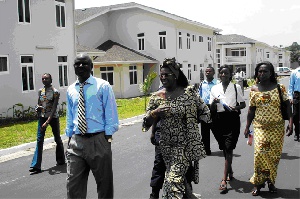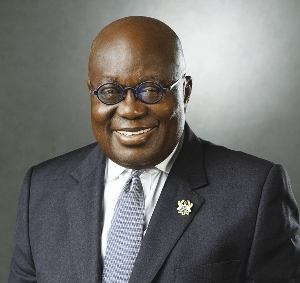- Home - News
- TWI News | TV
- Polls
- Year In Review
- News Archive
- Crime & Punishment
- Politics
- Regional
- Editorial
- Health
- Ghanaians Abroad
- Tabloid
- Africa
- Religion
- Election 2020
- Coronavirus
- News Videos | TV
- Photo Archives
- News Headlines
- Press Release
Opinions of Wednesday, 29 August 2007
Columnist: Okoampa-Ahoofe, Kwame
Oboshie Sai-Cofie Talks of "Modernism" and "Professionalism"
During her most recent weekly “walkabout” the nation’s capital, at least as reported by the Ghana News Agency (GNA), the Minister of Information and National Orientation (INO) appeared to have had two critical issues – or questions – on her mind, namely, the imperative need to promptly upgrade of the standard of journalism – both print and electronic – as practiced in the country, and the modernization of the cultural attitude of the proverbial average Ghanaian (Ghanaweb.com 8/16/07).
In the case of the appalling state of media practice in the country, Mrs. Oboshie Sai-Cofie counseled against the deleterious tendency of reporters to routinely fabricate news stories in a bid to short-circuiting the exacting but indispensable legwork that goes with accurate reportage. In sum, the INO minister obliquely indicated, the noble profession of information gathering and dissemination is not one that invites lethargy or indolence. In essence, those among the ranks of the practitioners of the profession who aimed to make a remarkable difference in Ghana’s democratic development, ought to appreciate the daunting reality of the fact that journalism is a “missionary venture,” rather than a prime avenue for making quick money, as it were. Even more significantly, Mrs. Sai-Cofie indicated the willingness of her ministry to facilitate accessibility of news-gatherers to government officials. This is quite refreshing, because it can hardly be gainsaid that a remarkable aspect of what makes for the difficult practice of effective journalism in Ghana has to do with the fact that some government officials have yet to recognize the centrality of the media institution to the nation’s democratic advancement. In brief, journalists are often envisaged as gadflies, people who are primarily out to foment trouble for the politically prominent.
The consequence of shunning the media, on the part of government officials, is that it creates an avoidable – and counterproductive – state of affairs whereby media practitioners find themselves having to second-guess these proverbial movers and shakers, or policymakers, in the form of having to, perforce, fabricate plausible rumors and other slanderous, and scandalous, narratives in order to fill the information vacuum created by such unsavory state of mutual distrust.
Historically, however, the problem goes much deeper; and it has almost squarely to do with the fact that Ghana’s pseudo-Socialist premiere regime of the so-called Convention People’s Party (CPP), otherwise known as the Nkrumah Corporation (NC), envisaged, (as, indeed, many a Third-World country of the time was wont to do), the media institution and profession as one that was primarily collaborative – under the patently specious guise of what was then termed as “Development Journalism” – rather than the more salutary and effective traditional role of a “Watchdog,” or one that unreservedly held the government of the day accountable to the people, of whose latter trust the media objectively, at least in theory, represented.
In sum, what needs to happen in order for the information industry and, by extension, our entire national democratic apparatus to function effectively, is for both the Ministry of Information and National Orientation and the media, at large, to “collaborate” in conducting regular seminars for both government, and other public, officials and media practitioners, with the sole aim of ensuring that practitioners, or players, in either sphere of national endeavor would be able to mutually and effectively appreciate the cultural, or operational, dynamics of the other.
Another critical issue that came to the fore during Mrs. Sai-Cofie’s most recent metropolitan “walkabout” – or tour-of-duty – is the fact that the concept of “modernism,” or “modernization,” is more of a cultural attitude than the sheer material objective, on the part of the Government, of erecting physical structures in public spaces, or lands, in order to “titivate” a hitherto perceived barren landscape, as Dr. Kofi Abrefa Busia once pointed out to the eponymous Pontiff of the Nkrumah Corporation.
Similarly, the entire ideological debate between Dr. J. B. Danquah, the putative Doyen of Gold Coast and Ghanaian politics, and the proverbial African Show Boy, hinged primarily on the sophomoric fact of Mr. Kwame Nkrumah having tended to envisage development in purely materialist terms, or in terms of constructing impressive physical structures, whereas for the immortalized Doyen, development was first and foremost an attitudinal re-orientation of the human sensibilities.
In other words, for example, the mere establishment of a university college, as a physical structure, is absolutely irrelevant unless the institution so created is also adequately equipped to run such, admittedly, significant cultural incentive to the organic benefit of the concerned society at large.
During her latest official tour of the Accra metropolis, Mrs. Sai-Cofie encountered this “titivation” riddle, when the INO chief discovered to her utter horror, and perhaps also embarrassment, that hawkers and other petty traders, located in the Nkrumah Circle area of Accra, preferred to swarm and congest the pedestrian walkways, as they have been doing for generations, to retailing their wares in the clinical comfort of a newly-constructed shopping mall specially allocated to most of these same traders.
On the preceding score, as Americans are wont to say, Mrs. Sai Cofie’s work is cut out for her. In sum, what needs to be promptly done is for the Ministry of Information and National Orientation to mount a vigorous public education campaign on the avoidable hazards wont to be created by such protean existence, in terms of such quality-of-life factors as fire safety, for example, and the easy, albeit unsavory, employment that such unplanned business culture invariably creates for muggers and pick-pockets, as well as other quality-of-life crimes and hazards.
The preceding, of course, as readily and aptly observed by the INO minister, must be coupled by a stringent law-enforcement policy, with defaulters being severely penalized.

Views expressed by the author(s) do not necessarily reflect those of GhanaHomePage.











